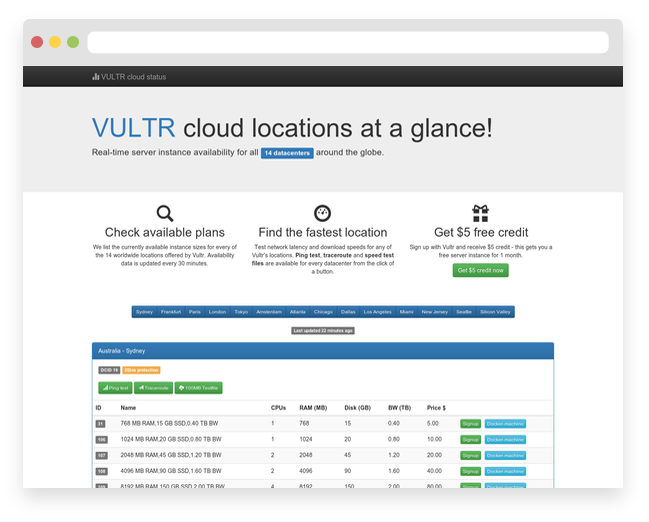Provision Vultr cloud instances using the docker-machine command line tool.
Prerequisites:
Docker Machine >= 0.5.1 (v0.9.0 or later is recommended)
Download the release tarball matching your platform/architecture from the release page.
Extract the tarball and copy docker-machine-driver-vultr to a folder in your PATH and make sure it's executable.
Grab your API key from the Vultr control panel and pass that to docker-machine create with the --vultr-api-key option.
Example for creating a new machine running RancherOS:
docker-machine create --driver vultr --vultr-api-key=abc123 rancheros-machine
Example for creating a new machine running Ubuntu 16.04:
docker-machine create --driver vultr --vultr-api-key=abc123 --vultr-os-id=215 ubuntu-machine
Command line flags:
--vultr-api-key: required Your Vultr API key.--vultr-ssh-user: SSH username.--vultr-region-id: Region the VPS will be created in (DCID). See available Region IDs.--vultr-plan-id: Plan to use for this VPS (VPSPLANID). See available Plan IDs.--vultr-os-id: Operating system ID to use (OSID). See available OS IDs.--vultr-ros-version: RancherOS version to use if an OSID was not specified (e.g. 'v0.6.0', 'latest').--vultr-pxe-script: PXE script ID. Requires the 'Custom OS' ('--vultr-os-id=159')--vultr-boot-script: Boot script ID. Mutually exclusive of '--vultr-pxe-script'.--vultr-ssh-key-id: Use an existing SSH key in your Vultr account instead of generating a new one.--vultr-ipv6: Enable IPv6 support for the VPS.--vultr-private-networking: Enable private networking support for the VPS.--vultr-backups: Enable automatic backups for the VPS.--vultr-userdata: Path to file with cloud-init user-data.--vultr-snapshot-id: Using snapshot to create host.--vultr-api-endpoint: Override default Vultr API endpoint URL.
If the OS ID is not specified, RancherOS will be used as operating system for the instance.
You can select a specific RancherOS version by specifying the --vultr-ros-version flag.
You can boot a custom OS using a PXE boot script that you created in your Vultr account panel by passing it's ID with the --vultr-pxe-script flag and setting --vultr-os-id to 159.
The operating system must support cloud-init and be configured to use the ec2 datasource type.
Environment variables and default values:
| CLI option | Environment variable | Default |
|---|---|---|
--vultr-api-key |
VULTR_API_KEY |
- |
--vultr-ssh-user |
VULTR_SSH_USER |
root |
--vultr-region-id |
VULTR_REGION |
1 (New Jersey) |
--vultr-plan-id |
VULTR_PLAN |
93 (1024 MB RAM,20 GB SSD) |
--vultr-os-id |
VULTR_OS |
- |
--vultr-ros-version |
VULTR_ROS_VERSION |
v0.7.1 |
--vultr-pxe-script |
VULTR_PXE_SCRIPT |
- |
--vultr-boot-script |
VULTR_BOOT_SCRIPT |
- |
--vultr-ssh-key-id |
VULTR_SSH_KEY |
- |
--vultr-ipv6 |
VULTR_IPV6 |
false |
--vultr-private-networking |
VULTR_PRIVATE_NETWORKING |
false |
--vultr-backups |
VULTR_BACKUPS |
false |
--vultr-userdata |
VULTR_USERDATA |
- |
--vultr-snapshot-id |
VULTR_SNAPSHOT |
- |
--vultr-api-endpoint |
VULTR_API_ENDPOINT |
- |
Check out vultr-status.appspot.com for a live listing of the available plans per region. Get the corresponding --vultr-region-id and --vultr-plan-id parameters with the click of a button.




